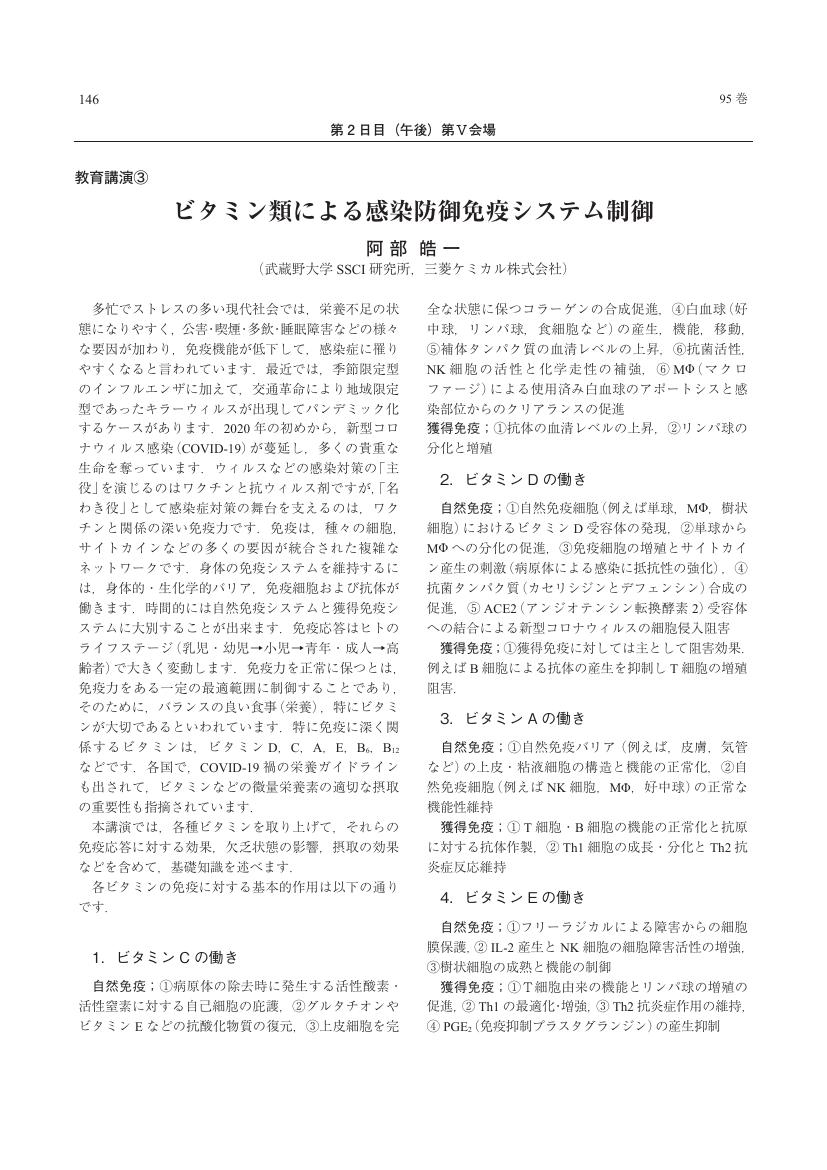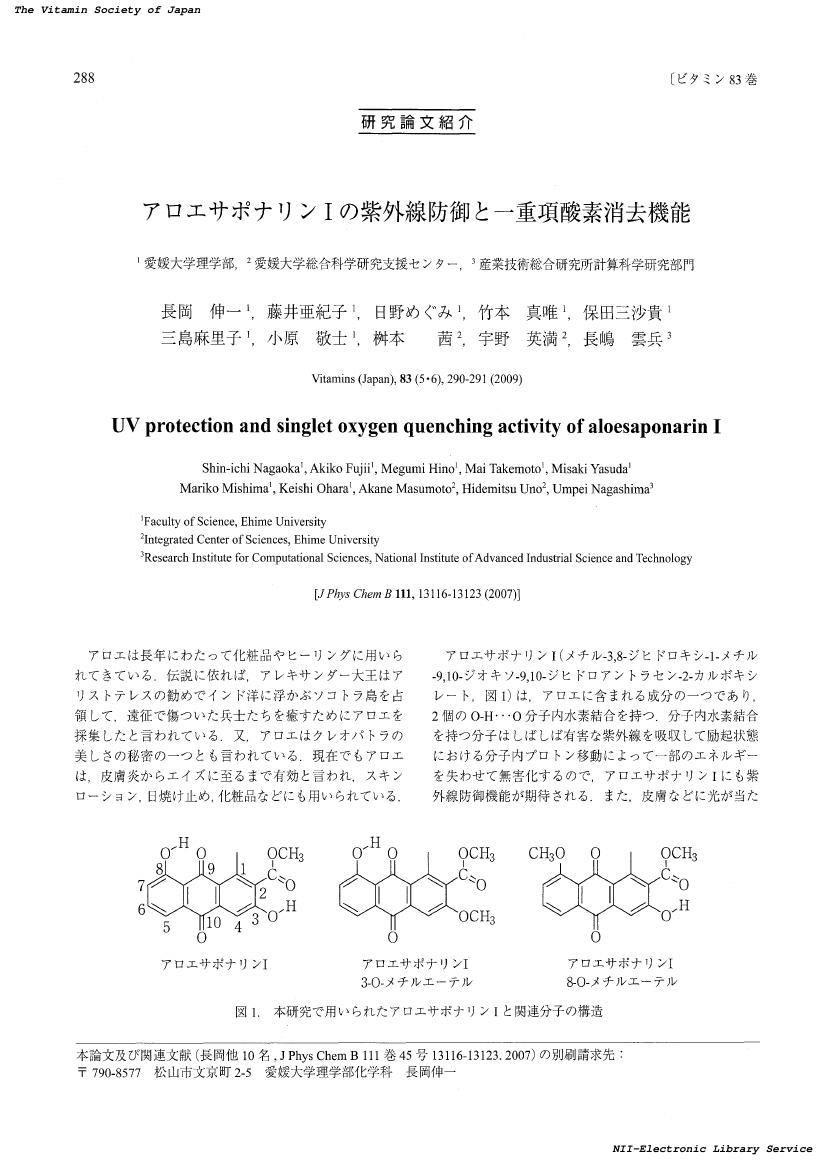- 著者
- 影近 弘之
- 出版者
- 公益社団法人 日本ビタミン学会
- 雑誌
- ビタミン (ISSN:0006386X)
- 巻号頁・発行日
- vol.72, no.7, pp.297-303, 1998-07-25 (Released:2017-12-26)
- 参考文献数
- 43
1 0 0 0 OA ビタミンB_<12>は試験管内だけでなく体内でも紫外線によって分解される
- 著者
- 山田 正二 山田 惠子
- 出版者
- 公益社団法人 日本ビタミン学会
- 雑誌
- ビタミン (ISSN:0006386X)
- 巻号頁・発行日
- vol.89, no.7, pp.354-357, 2015-07-25 (Released:2017-08-10)
- 著者
- 嶌越 恒
- 出版者
- 公益社団法人 日本ビタミン学会
- 雑誌
- ビタミン (ISSN:0006386X)
- 巻号頁・発行日
- vol.95, no.4, pp.176-177, 2021-04-25 (Released:2022-04-30)
1 0 0 0 OA ビタミンE濃度の男女差と月経周期による変動
- 著者
- 池田 彩子 鈴木 規恵 内田 友乃
- 出版者
- 公益社団法人 日本ビタミン学会
- 雑誌
- ビタミン (ISSN:0006386X)
- 巻号頁・発行日
- vol.91, no.9, pp.573-575, 2017 (Released:2018-09-30)
1 0 0 0 OA 脊椎動物の腸を支配する神経の系統発生学的由来と その神経を介するビタミンAの貯蔵
- 著者
- 目崎 喜弘
- 出版者
- 公益社団法人 日本ビタミン学会
- 雑誌
- ビタミン (ISSN:0006386X)
- 巻号頁・発行日
- vol.91, no.11, pp.655-656, 2017 (Released:2018-11-30)
- 著者
- 田中 清 桒原 晶子 津川 尚子
- 出版者
- 公益社団法人 日本ビタミン学会
- 雑誌
- ビタミン (ISSN:0006386X)
- 巻号頁・発行日
- vol.91, no.2, pp.135-138, 2018 (Released:2018-04-12)
- 著者
- 清水 誠 薩 秀夫
- 出版者
- 公益社団法人 日本ビタミン学会
- 雑誌
- ビタミン (ISSN:0006386X)
- 巻号頁・発行日
- vol.78, no.11, pp.555-563, 2004-11-20 (Released:2017-10-10)
- 参考文献数
- 36
食品中の栄養素や機能性成分が体内に吸収される場として小腸上皮はもっとも重要である. 小腸における吸収(物質輸送)の効率を変化させれば, 体内に入る栄養素の量をコントロールすることができる. 近年開発が急速に進んでいる特定保健用食品の中には, 腸管における栄養素吸収を制御することを主要なメカニズムとする製品も多い. 糖の消化吸収を抑え血糖値の上昇を抑制する食品, コレステロールの吸収を抑えて血清コレステロールレベルを制御する食品, 中性脂肪の消化吸収を抑えて肥満を予防しようという食品, ミネラルの腸管吸収を促進する食品など, 腸管における栄養素の消化吸収を制御することは, 生活習慣病の予防のための簡単でかつ実効性の高い戦略と認識され, 利用されている. また, 腸管上皮は食品成分をはじめとする腸管内容物と直接接触する組織であり, 食品成分の影響を受けやすい組織でもあると推定される. 物質の吸収のみならず, 食品成分が持つさまざまな情報を受容し, それに応答する組織としても腸管上皮は興味深い.
1 0 0 0 OA ビタミン類による感染防御免疫システム制御
- 著者
- 阿部 皓一
- 出版者
- 公益社団法人 日本ビタミン学会
- 雑誌
- ビタミン (ISSN:0006386X)
- 巻号頁・発行日
- vol.95, no.4, pp.146-147, 2021-04-25 (Released:2022-04-30)
1 0 0 0 OA アロエサポナリンIの紫外線防御と一重項酸素消去機能(研究論文紹介)
1 0 0 0 OA 必須脂肪酸欠乏の生体制御機構に関する研究
- 著者
- 市 育代
- 出版者
- 公益社団法人 日本ビタミン学会
- 雑誌
- ビタミン (ISSN:0006386X)
- 巻号頁・発行日
- vol.94, no.1, pp.18-25, 2020-01-25 (Released:2021-01-31)
In mammals, polyunsaturated fatty acids (PUFAs) such as linoleic acid (18:2n-6) and α -linolenic acid (18:3n-3) cannot be synthesized de novo. Therefore, these PUFAs are essential fatty acids (EFAs). However, these PUFAs can be converted to arachidonic acid (20:4n-6) and eicosapentaenoic acid (20:5n-3). Mead acid (20:3n-9), is an unusual n-9 series PUFA, which is endogenously synthesized from oleic acid (18:1n-9) in an essential fatty acid (EFA)-deficiency state. In this study, we showed that Mead acid was produced from oleic acid by two desaturation enzymes (FADS1 and FADS2) and one elongation enzyme (ELOVL5), indicating that n-3, n-6, and n-9 PUFAs are metabolized by the same enzymes. Furthermore, ELOVL5 acquired an elongation activity towards oleic acid under EFA-deficient state, which allows it to synthesize Mead acid. We revealed a novel regulatory mechanism that the substrate preference of ELOVL5 was modified by a post-translational modification. The function of Mead acid during EFA-deficiency is not known, but we showed that the inhibition of Mead acid synthesis induced hepatic triacylglycerol accumulation via the suppression of very low-density lipoprotein (VLDL) secretion in EFA-deficiency mice. From these results, it is possible that Mead acid functions as a substitute for the PUFA produced from EFAs in VLDL secretion during EFA-deficiency.
1 0 0 0 OA ユーグレナはどこまで高栄養食源として貢献し得るか ―その機能と応用―
- 著者
- 中野 長久 大串 美沙 渡邊 敏明
- 出版者
- 公益社団法人 日本ビタミン学会
- 雑誌
- ビタミン (ISSN:0006386X)
- 巻号頁・発行日
- vol.91, no.5.6, pp.323-330, 2017 (Released:2018-06-30)
Food includes complicated and wide-ranging ingredients. In order to support life, we digest and absorb only necessary ingredients (nutrients), which are selectively metabolized for the formation of energy and/ or body components, to utilize the necessary nutrients. However, eating habits under full-feeding in our country seem to be in the process to transform disrupted eating habits leading to health damage, because a gap between health expectancy and life expectancy remains still large due to the development of lifestyle diseases including obesity which are caused by an unbalanced diet and/or disrupted food style. In order to bring health expectancy near to life expectancy by correcting disrupted eating habits as much as possible, we should consider the factor to reduce the gap between health expectancy and life expectancy. One of the ways to reduce the gap is a skillful application of food functions to the improvement of disrupted eating habits and also the combination of the improvement of disrupted eating habits by application of food functions with exercise can be thought to be an important factor to reduce the gap. As an example of the application of food functions to the improvement of disrupted eating habits, we will introduce the application of Euglena (Japanese name, Euglena gracilis) based on its physiological functions as a nutrient to improve disrupted eating habits in this review.
- 著者
- 藤井 健志
- 出版者
- 公益社団法人 日本ビタミン学会
- 雑誌
- ビタミン (ISSN:0006386X)
- 巻号頁・発行日
- vol.94, no.5-6, pp.319-323, 2020-06-25 (Released:2021-06-30)
コエンザイムQ10の研究には、長く酸化型コエンザイムQ10(ユビキノン)が使われていたが、活性型である還元型コエンザイムQ10(ユビキノール)の工業生産が開始された2000年以降はユビキノールを用いた臨床研究が行われるようになった。 ユビキノールが関連する疾患には、体内濃度の低下が関連していることが多い。ユビキノール生合成遺伝子の一塩基多型も疾患との関連が示されているが、それら疾患の半分近くが脳神経系という特徴がある。パーキンソン病患者に対するダブルブラインド試験では、300mg/dayの摂取量でドーパミンとの併用効果が示された。一方、健常人を対象としたダブルブラインド試験は100~150mg/dayで行われている。疲れがちな健常者を対象とした試験では、疲労感や眠気の改善、意欲の向上が認められた。軽い季節性のアレルギー様の症状を持つ健常人に対しては、眼や鼻のかゆみと睡眠の改善が示された。 長期摂取による安全性と効果を評価している地域密着型臨床研究では、長期摂取時の安全性と共に自覚的QOLや認知機能の改善が示唆された。更に摂取を中断することによって血中濃度と共に自覚的QOLが低下することも示唆された。 このようにユビキノールは幅広い臨床症状の改善が示唆されており、その活用が期待できる。
1 0 0 0 OA 5.COVID-19 感染者における血中ネオプテリンの変化について
1 0 0 0 OA 徐放性ビタミンC製剤を健康成人男子に経口投与したときのビタミンCの血漿濃度及び尿中排泄
- 著者
- 村田 晃 平田 祥子 松岡 昌義 日比 善朗 柏原 俊夫 北森 信之 玉井 浩 美濃 真
- 出版者
- 公益社団法人 日本ビタミン学会
- 雑誌
- ビタミン (ISSN:0006386X)
- 巻号頁・発行日
- vol.64, no.5-6, pp.285-294, 1990-06-25 (Released:2018-03-17)
Two multipore-type sustained-release preparations (VC-SR-A and VC-SR-B) containing 500 mg of vitamin C were prepared, which were coated with mixtures of water-soluble polyethylene glycol and insoluble ethylcellulose. The preparations differed in the dissolution profile of vitamin C; the in vitro release rates being 7.3 %/h for VC-SR-A and 14.2 %/h for VC-SR-B. The bioavailability of vitamin C after the administration of a single dose was examined in six subjests (25-32 years) who had been saturated with vitamin C, and compared with an osmorelease-type sustained-release preparation (AcuSystem C) and a conventional immediate-release preparation (VC-IR) in a crossover trial. The mean T_<max> was 3 h for VC-IR, 6 h for VC-SR-B, 7 h for VC-SR-A and 8.5 h for AcuSystem C. Mean C_<max> (mg/100ml) were 0.28 for VC-SR-A, 0.40 for AcuSystem C, 0.48 for VC-SR-B and 0.74 for VC-IR. The mean AUC (mg.h/100 ml, 0-24 h) was 3.43 for VC-SR-A, 5.73 for AcuSystem C, 6.68 for VC-SR-B and 6.80 for VC-IR. The mean percentages of the dose excreted in the 24-h urine were 7.7 for VC-SR-A, 17.6 for AcuSystem, 23.4 for VC-SR-B and 39.1 for VC-IR. The results indicate that for VC-SR-B the rate of bioavailability is slower but prolonged and thus the extent of bioavailability is almost equal to that of VC-IR. Also, concerning retention of vitamin C in the body, VC-SR-B seems to be preferable to VC-IR.
1 0 0 0 OA 年代別のビタミンB12 摂取量に関する検討 国民健康・栄養調査結果の再解析
- 著者
- 青 未空 宮脇 尚志 田中 清
- 出版者
- 公益社団法人 日本ビタミン学会
- 雑誌
- ビタミン (ISSN:0006386X)
- 巻号頁・発行日
- vol.93, no.11, pp.478-484, 2019-11-25 (Released:2020-11-30)
Objective: Recently, even vitamin B 12 (B 12 ) insufficiency, which is milder than B 12 deficiency, has been reported to increase various diseases risks through hyperhomocysteinemia. Therefore, we investigated B 12 intake by age using the data of the National Health and Nutrition Survey (NHNS). Method: We re-analyzed the data of the NHNS 2015. Data from 6941 subjects out of 8583 subjects, after excluding subjects under the age of 18, female subjects with pregnancy or breastfeeding, and subjects with energy intake over the average ± 2SD, were analyzed. Results: The percentage of subjects whose B 12 intake was below the estimated average requirement (EAR) was 30.7% for those under 50 years old and 19.1% for those equal to or higher than 50 years old. The presence of raw seafood, processed seafood, and viscera mainly contributed to B 12 intake. The percentage of subjects eating raw or processed seafood increased with increasing age. Conclusions: B 12 intake was less than EAR in a substantial percentage of subjects, especially those under 50 years old. Low seafood intake could be considered as this cause. Examination and research approach considering age for B 12 intake are desirable in future.
1 0 0 0 OA ビタミンEと皮ふ微細循環機能
- 著者
- 神村 瑞夫
- 出版者
- 公益社団法人 日本ビタミン学会
- 雑誌
- ビタミン (ISSN:0006386X)
- 巻号頁・発行日
- vol.33, no.2, pp.166-173, 1966-02-25 (Released:2018-02-09)
- 被引用文献数
- 1
Experimental studies of the vitamin E on the skin microcirculation were done, especially on the capillary resistance, capillary permeability, skin temperature and skin blood volume, mainly on the human skin. Discussing the results it was concluded that vitamin E had the accelerating and normalising effects on the arteries and venous microcirculation, especially at the peripheral region.
1 0 0 0 OA ヒトの皮ふ毛細血管透過性に及ぼすビタミンEの影響
- 著者
- 神村 瑞夫 佐藤 昌三 辺見 泉 佐々木 恒臣
- 出版者
- 公益社団法人 日本ビタミン学会
- 雑誌
- ビタミン (ISSN:0006386X)
- 巻号頁・発行日
- vol.28, no.2, pp.129-131, 1963-08-25 (Released:2018-01-30)
Experimental studies of the pharmacodynamic action of α-tocopherol upon the capillary permeability in the human skin were done. It was found that the α-tocopherol reduced the increased capillary permeability, particulary of extravasal plasma protein leakage caused by various chemical and physical factors such as histamine, acetylcholine, α-chymotrypsin, negative pressure and cold.
1 0 0 0 OA (2)コラーゲン生合成におけるビタミンCの役割
- 著者
- 大塚 惠 荒川 信彦
- 出版者
- 公益社団法人 日本ビタミン学会
- 雑誌
- ビタミン (ISSN:0006386X)
- 巻号頁・発行日
- vol.73, no.2, pp.99-101, 1999-02-25 (Released:2017-12-26)
- 参考文献数
- 25
1 0 0 0 OA 人体におけるアミノプテリン投与による実験的低葉酸血状態における尿中アミノ酸の変動について
- 著者
- 森 甫
- 出版者
- 公益社団法人 日本ビタミン学会
- 雑誌
- ビタミン (ISSN:0006386X)
- 巻号頁・発行日
- vol.7, pp.389-392, 1953 (Released:2017-12-20)
1 0 0 0 OA ビタミンCとがん(II) : ニトロソアミンの生成を防ぐビタミンC
- 著者
- 村田 晃
- 出版者
- 公益社団法人 日本ビタミン学会
- 雑誌
- ビタミン (ISSN:0006386X)
- 巻号頁・発行日
- vol.53, no.3, pp.163-164, 1979-03-25 (Released:2018-03-07)











